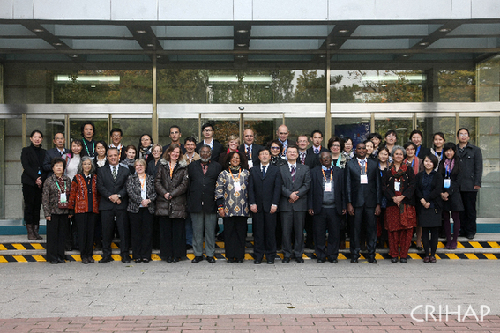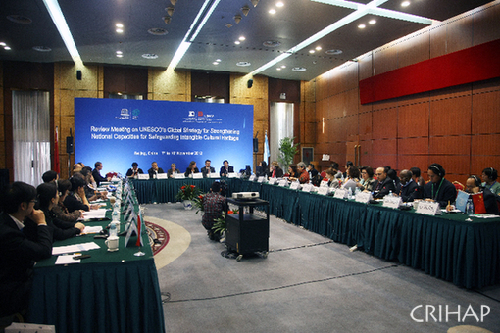Review Meeting on UNESCO’s Global Strategy for Strengthening National Capacities for Safeguarding Intangible Cultural Heritage opened in Beijing

Are we proceeding on the right path? This was the key question discussed during the review Meeting on UNESCO’s Global Strategy for Strengthening National Capacities for Safeguarding Intangible Cultural Heritage held in Beijing from Nov 7-11, 2012. More than 40 experts and scholars from Asia-Pacific, Africa, Arabia and Latin America, Chinese officials in charge of intangible cultural heritage safeguarding departments, experts in related fields and UNESCO officials gathered in Beijing for the event. They evaluated the implementation of UNESCO’s global strategy for strengthening national capacities for safeguarding intangible cultural heritage and discussed and made recommendations for the strategy’s future direction. The meeting was organized by the International Training Centre of the UNESCO Asia-Pacific Intangible Cultural Heritage.

Since The Convention of Safeguarding Intangible Cultural Heritage was approved nearly 10 years ago, 146 countries have become contracting parties of the convention. Every country positively responded to and comprehensively participated in the intangible cultural heritage safeguarding work under the framework of the convention, which greatly promoted the safeguarding of intangible cultural heritage at the national level. However, their awareness and practical ability of the spiritual connotation of the convention, related working mechanisms and their own duties still need to be improved. To make sure every country can fulfill its duty and benefit from the international cooperative mechanism, UNESCO put forward the Global Strategy for Strengthening National Capacities for Safeguarding Intangible Cultural Heritage in 2010-2011. Its aim is to strengthen the ability of every country to implement the convention through training activities in related fields and promote the sustainable development of the global intangible cultural heritage safeguarding cause and related countries and communities.
It is said that the training program design based on the specific demand of the beneficiary country is one highlight of the global strategy. The completed training activities include content in five fields: the amendment of related safeguarding policy and regulation, the construction of related safeguarding mechanism, the inventorying of intangible cultural heritage, the participation in international cooperative mechanism of the convention and the study of related knowledge and skill in the application of the heritage list and international aid.

In addition, since the strategy was implemented more than a year ago, it has seen encouraging results. Seventy-seven experts from different places in the world (30% are from Africa and 40% are female) have been trained themselves to train others in the strategy. Among them, 24 experts have hosted over 80 training activities in seven languages all over the world: Arabic, English, French, Portuguese, Spanish, Russian and Uzbek. Some 1,600 people have benefited from the training activities, including government officials, non-governmental organizations and experts, many of whom are community members and young people.
In May 2010, the Chinese government signed an agreement with UNESCO to build an international training center for UNESCO Asia-Pacific intangible cultural heritage in China with capacities construction and training as its main functions. It fully embodied the desire of the Chinese government to push forward the intangible cultural heritage safeguarding cause in the Asia-Pacific region and the whole world. In January 2011, the Asia-Pacific center successfully hosted the first teacher training class under the framework of the capacities construction strategy, which is an important symbol for the strategy’s implementation. This meeting, organized by the Asia-Pacific Centre and UNESCO, was to assess and summarize the experience and problem in past years. Organizers sought to deepen the strategy through international training and exchanges and cooperation in the future, and finally make contributions to promote the safeguarding work and sustainable development of the intangible cultural heritage in the Asia-Pacific region and the whole world.

Address: 81, Laiguangying West Road, Chaoyang District, Beijing, China
Zip Code: 100021
Tel: 86-10-64966526
Fax: 86-10-64969281
E-mail: crihap@crihap.cn
Leave us your e-mail address, we'll let you know about current events.



